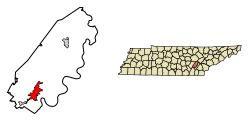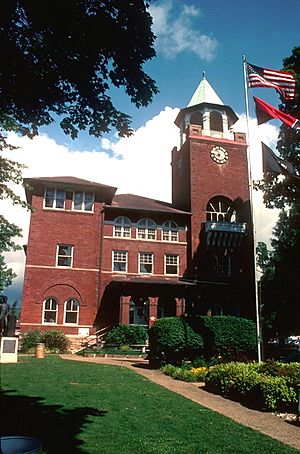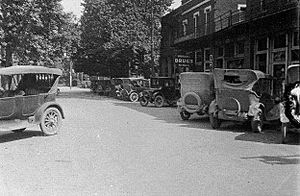Dayton, Tennessee facts for kids
Quick facts for kids
Dayton, Tennessee
|
|
|---|---|

Location of Dayton in Rhea County, Tennessee.
|
|
| Country | United States |
| State | Tennessee |
| County | Rhea |
| Settled | ca. 1820 |
| Incorporated | 1903 |
| Named for | Dayton, Ohio |
| Area | |
| • Total | 8.74 sq mi (22.64 km2) |
| • Land | 8.50 sq mi (22.02 km2) |
| • Water | 0.24 sq mi (0.61 km2) |
| Elevation | 696 ft (212 m) |
| Population
(2020)
|
|
| • Total | 7,065 |
| • Density | 830.79/sq mi (320.78/km2) |
| Time zone | UTC−5 (Eastern (EST)) |
| • Summer (DST) | UTC−4 (EDT) |
| ZIP code |
37321
|
| Area code | 423 |
| FIPS code | 47-19700 |
| GNIS feature ID | 1306293 |
Dayton is a city in Tennessee, USA. It's the main town, or county seat, of Rhea County. In 2020, about 7,065 people lived here. The city is part of a larger developed area that reaches south towards Graysville.
Dayton is famous for the Scopes Trial in 1925. This trial was about whether evolution could be taught in public schools.
Contents
History of Dayton
Dayton started around 1820. It was first called Smith's Crossroads. In 1877, the town changed its name to Dayton. It was named after Dayton, Ohio. The town officially became a city in 1903. Early on, factories here made things like pig iron.
The Scopes "Monkey" Trial
In 1925, a very famous court case happened in Dayton. It was called the Scopes Trial, also known as the "Monkey Trial." This event brought many reporters and people to the town.
The trial was about teaching evolution in schools. John T. Scopes, a local science teacher, was accused of breaking a state law. This law made it illegal to teach evolution.
Two very famous lawyers were part of the trial. William Jennings Bryan was the prosecutor. Clarence Darrow was the main lawyer for the defense.
A man named George Rappleyea helped start the trial. He thought it would bring a lot of attention to Dayton. He was right! The town became very busy with people wanting to know the outcome.
After the trial, William Jennings Bryan stayed in the area. He died just five days later in Dayton.
Dayton's Geography
Dayton is located in Tennessee. The city covers about 8.74 square miles (22.64 square kilometers). Most of this area is land, with a small part being water.
Dayton's Climate
Dayton has four clear seasons. Summers are hot and humid. Spring and fall are warm and mild. Winters are cool, and sometimes it snows a little.
Dayton's Population
Dayton's population has grown over the years. In 1880, only 173 people lived here. By 2020, the population was 7,065.
Most people in Dayton are White (about 80.67%). There are also Black or African American residents (4.35%) and Hispanic or Latino residents (8.7%).
Dayton's Economy
Dayton is a center for manufacturing. Factories here make furniture, clothes, and parts for cars and recreational vehicles.
- La-Z-Boy is a big employer, making furniture.
- Other companies include Suburban Manufacturing and Robinson Manufacturing.
- Nokian Tyres, a company from Finland, opened a tire factory here in 2019. It plans to hire about 400 people.
- Two nuclear power plants, Watts Bar and Sequoyah, are close to Dayton.
Since the late 1990s, more homes have been built near Chickamauga Lake. This lake is part of the Tennessee River. Dayton also hosts big bass fishing tournaments at Chickamauga Lake. These events bring many visitors to the city.
In 2019, STULZ Air Technology Systems opened a new factory in Dayton. They make heating and cooling systems. This brought over 250 new jobs to the city.
Education in Dayton
Dayton has several schools and colleges:
- Bryan College is a four-year Christian college. It's named after William Jennings Bryan.
- Chattanooga State Community College has a campus downtown. It offers many courses.
- Dayton City School is a public school for students from kindergarten to 8th grade.
- Students in high school attend Rhea County High School.
- Rhea Central Elementary School is just outside the city. It's one of the largest elementary schools in the state.
- Omega Graduate School is a Christian graduate school in the Crystal Springs area.
Notable People from Dayton
Many interesting people have connections to Dayton:
- Howard Armstrong (1909–2003) – A musician who played country blues.
- Joseph Aloysius Durick (1914–1994) – A Roman Catholic bishop and civil rights supporter.
- Jake Gaither (1903–1994) – A Hall of Fame football coach.
- Russ Hodges (1910–1971) – A famous baseball announcer.
- Red Holt (1894–1961) – A former Major League Baseball player.
- Dave Roller – A former NFL player.
- John Scopes (1900–1970) – The teacher from the famous Scopes Monkey Trial.
- Rachel Held Evans (1981–2019) – A columnist and best-selling author.
- Cory Gearrin (born 1986) – A Major League Baseball pitcher.
- Walter White – A member of the Tennessee General Assembly.
Images for kids
See also
 In Spanish: Dayton (Tennessee) para niños
In Spanish: Dayton (Tennessee) para niños
 | May Edward Chinn |
 | Rebecca Cole |
 | Alexa Canady |
 | Dorothy Lavinia Brown |




